#his inability to write character flaws
Explore tagged Tumblr posts
Note
Just curious but I don't get why DC fans hate Tom Taylor's guts.
He seems like a sweet guy and I found his work on Nightwing and Superman: Son Of Kal-El to be fantastic. And, no. I refuse to believe he "secretly co-wrote" the hated Ric Grayson storyline or the controversial Superman Unity Saga (where Jon Kent is aged up).
I just don't get it.
if ur sincerely refusing to engage with the documented, legitimate criticism with taylors work that is easy to find online if u decide to look for it then i can’t help u babydoll
#also ur focusing on ric grayson is v funny to me lmao#the ableism. the sexism. everything about injustice. his cringe centrist politics. everything about babsgirl#his dogpiling on legitimate criticism from marginalised fans#his inability to write character flaws#the list goes on lmao#the actual shit his work contains is the issue people have with him#that and his shitty ass tweet to chuck dixon like this man doesn’t have a moral backbone#the ask and the answer
76 notes
·
View notes
Note
A note accompanies the now destroyed disc.
“The worst, deadliest, most monstrous creature you can find - trap it, cage it. Leave it completely alone with only its thoughts and its prison.
Send it right to me, Xephos.”
Xephos' hands grip the note so tightly Barry is shocked the paper hasn't torn. The red marker across the page is easy to read, even as the note trembles with Xephos' own fear. He can feel Lalna fretting behind him, unused to being the source of distress, unsure what he'd done to provoke the reaction.
"What -" He cringes guiltily at Xephos' flinch, but the other man is at least looking at him now. "Do you - do you know what it's talking about?" Xephos looks at him blankly. It made something in his chest twist uncomfortably. "The monster?"
Oh. Oh no. Barry missed the blank look.
It was a lot better than this.
Lalna made a distressed noise behind him, a movement towards Xephos aborted half way through as the flinch rolled through his body like a blow. He was smiling, bitter and scared and guilty and Barry was missing something because why on earth was he so scared of Lalna?
"Me."
The word ripped through Lalna and Barry like a bullet, deafening for how quietly it was spoken.
"He's talking about me."
#asks#yogfic#sorry i took so long to respond! i've been exhausted for a few days so i was waiting until i was awake enough#to write something that made sense haha#jaffactory 2#jaffa factory 2#guilty guilty xeph who is trying so hard to forget what he's done because if he remembered he wouldn't be able to live with himself#and he can almost hide behind 'im a clone - someone messed with my memory'#almost.#because he knows in his bones *hes* the one who did it#character who's greatest flaw is their inability to recognise they aren't always at fault. but who is *often enough* at fault#that you'll never change their mind
5 notes
·
View notes
Note
Hi I love your writing!! can I request headcanons of arcane characters if they’re s/o was blind??💕
Arcane characters with a s/o that's blind! | Ekko, Vi, Jinx, Viktor x Gn! Reader



I absolutely love this idea, so thank you very much for your request, and I hope you'll enjoy this!<3
Content: Reader is blind/visually impaired, romantic relationships, fluff, sfw
Reader has no set pronouns.
((Not proofread))

》EKKO
He doesn't treat you any differently than anyone else, just based on your disability, but still does his best to make the hideout as accessible as possible for you. Ekko never wants you to feel like a burden either.
He definitely sometimes forgets that you're blind and asks your opinion on things he was looking at aa if you could see them too. He gets very embarrassed after realising, but you at least find it endearing.
Anyone who comments on your disability negatively will be dealt with. The last thing he wants is for you to feel bad about it when you should feel supported instead.
Allows you to touch his face or hair whenever you want, since that's the best way for you to visualize him. He'll shyly deny any compliments you give him but is deep down very flattered that you find him handsome even with your inability to see.
Since you can't fly a hover board on your own for obvious reasons, he often takes you on rides himself. He'll keep a tight hand around your waist whilst he enjoys the sight of you giggling and laughing in the evening sun with him.

》VI
God forbid anyone ever mistreats you or speaks badly about your disability because she won't hesitate to end them. You definitely have to hold her back at least once a day from putting someone 6 feet under.
With that said, she's extremely overprotective, perhaps near overbearing at times. She doesn't want you to accidentally get hurt or lost, especially when you're walking around Zaun.
She guides your fingers across her many tattoos, hoping you'll be able to visualize what they look like that way when you're curious about them. Vi is thankful that you can't see her red face.
She definitely also sometimes forgets your blind, which always ends up in a laughing fit for you. Hearing her embarrassed apologies always makes you feel so at ease about your disability.

》JINX
She was fascinated by you from day one. Something about you perceiving the terrible world she grew up in so differently drew her to you deeply. You couldn't see the flaws across her face and body or the shimmer that glowed in her eyes and ruined her from the inside. No, you saw her soul, and that's what made her love you.
Her hideout is practically baby proofed for you with special handrails and fences that protect you from accidentally falling off. It took her days to make, but seeing your excited face at the accessibility made it all worth it.
Jinx and Isha always hold your hand when walking around outside, as Zaun, just so you don't get lost or hurt.
Anyone who tries hurting or insulting you is as good as dead, so you never have to worry about a thing with her around.

》VIKTOR
He understands you better than anyone else due to his own disability. He never wants you to feel like he does and therefore makes sure you don't feel like a burden or discouraged by it.
Viktor makes many little inventions for you that help you around the house or in public. Whether it's for navigating the city safely or cooking up a meal completely on your own without incident, everything he does is for you to strengthen your sense of independence, since he knows you can't always rely on him.
He takes small walks around campus with you and describes your surroundings in great detail whilst holding onto your hand tightly.
Viktor also definitely likes to joke that you're matching whenever you both are out with a cane in hand. Hearing you giggle about it every time makes his day.

#arcane#arcane x genderneutral reader#arcane x reader#arcane x y/n#arcane x you#arcane ekko#arcane ekko x reader#ekko#ekko x reader#arcane vi#arcane vi x reader#vi#vi x reader#jinx arcane#arcane jinx#arcane jinx x reader#jinx#jinx x reader#arcane viktor x reader#arcane viktor#viktor#viktor x reader
1K notes
·
View notes
Text
It's often noted, in discussions of the Death Note anime, that it's much weaker than the manga in its rendition of post-timeskip events partly for pacing reasons: the pre-timeskip parts of the anime adapt ~6.5 manga-volumes in 25 episodes, while the post-timeskip parts adapt ~5.5 in 12 episodes, so a lot more important detail-work is lost and the whole thing ends up feeling kind of perfunctory.
Much less often noted as far as I've seen, but nonetheless also true, is that the Death Note anime removes some important characterization-nuance from Light, starting right near the beginning, whose presence elevates the manga to be substantially better than the anime even before the time-skip.
In particular: the Death Note manga is, at its core, a tragedy in classic "character who has everything falls into ruin due to a fatal personal flaw" style. Light is a brilliant student who, in the future ahead of him, has the potential to do practically whatever he wants. He's driven to ruin by the fatal flaw of unwillingness to admit, either to others or to himself, when he's made a mistake. This flaw is an essential piece of his characterization, in the manga. And the anime pretty much entirely skips over it.
As portrayed in the manga, Light's decision to become Kira—which ultimately leads to his downfall—is made in the following way. First, he finds the Death Note, and is led by morbid curiosity to write a name in it, killing someone. Then, still not really believing it, he kills a second person too. At which point it hits him that he's killed two people. And at that point, after a viscerally-horrified breakdown about what he's done, the inability to admit mistakes kicks in, and he proceeds to rewrite his own value-system such that it yields the result that killing those people was actually okay, and in fact morally good. Because the alternative would be for him to acknowledge himself as having made a terrible mistake, and that, more than anything else, is something he's unwilling to do if he can see any other option at all. And then, having convinced himself that those two murders were good, he proceeds to reason that, if they were good, then doing more like them is good; and thus he becomes Kira, leading eventually, far down the line, to his ruin. The anime, by contrast, substantially deemphasizes this flaw of his, portraying him as much more calmly put-together through that series of events and thus making him come across as having been tempted in becoming-Kira-ward directions all along.
Similarly, in the anime, when Light leaks a bunch of information to L about his identity by using non-public information acquired via police channels, he declares that actually this was deliberate as a means of baiting L out so he can kill him, and the anime presents this declaration pretty uncritically. The manga, by contrast, presents it as an extension of that same character-flaw: Light is unwilling to admit to having actually just straightforwardly messed up, and therefore makes up a new plan to view himself to have been following-all-along, thus leading him to take more risks in his game against L going forward and thus, once again, helping him along the path to ruin.
Et cetera.
Compared with the manga, then, the anime's version of Light's characterization ends up less interesting. And, moreover, it introduces a plot hole, when the Yotsuba arc comes around! It makes it much less clear why an amnesiac Light would be so straightforwardly aligned against Kira. In the manga, this is pretty clear: a Light who never killed anyone wouldn't have rewritten his values to consider killing people to be good, and therefore would look at Kira as straightforwardly evil. And, in fact, his amnesiac self has trouble taking the possibility of his having been Kira previously, even as the evidence starts building up, because becoming Kira would be a mistake according to his value-system of the moment, and this leaves him having a very hard time contemplating the possibility of its having in fact happened! Whereas the anime, by deemphasizing Light's big flaw, makes his amnesiac-self's differences from the way he is for most of the story up to that point come across as much more out-of-nowhere, much less narratively well-founded.
So, overall, the people who talk about the Death Note manga as superior to the anime specifically post-timeskip strike me as somewhat understating things. The manga is superior to the anime pre-timeskip, too, via that extra layer of characterization and a resulting improvement both in character-interestingness and in plot-coherence. And thus I consider the manga to be very much the definitive version of Death Note from start to finish, despite the anime's relatively-higher popularity.
#Archive#Death Note#Analysis#there was a gap of about a decade between when i first watched the death note anime and when i first read the death note manga#(the me of ~2011-2012 when i first watched the anime was bad at recognizing characters / following action / etc. in black-and-white comics#and thus impaired in her manga-reading abilities in general)#but i'm glad i finally got around to reading the manga eventually#even if it did take me a while#(to be clear: i read it in 2022; this post isn't downstream of having recently read the manga)#(just of having recently been thinking idly about it and thus remembering this as an infodump-possibly-worth-posting)
728 notes
·
View notes
Note
Someone told me they weren't a fan of Silver because he's written too heroically good without any flaws. To be fair, you don't have to like Silver at all; to each their own, but I don't understand how someone can go through Book 7 and not see the blatant flaws the writers gave him.
If I had to pinpoint why his flaws aren't as well seen, it is likely because he's not intentional about any harm he causes at all. It's not as shown in Book 7, but he's like Kalim where he is known to be naive, oblivious, and blunt to an almost painful degree, lacking total social awareness in most situations. In Book 7, specifically, we see that he has total self-worth issues, where he feels like he needs to repay Lilia for raising him (he doesn't) and constantly apologizes for things outside of his control (like Malleus's overblot). Poor self-worth is still a character flaw, even if it doesn't necessarily have a negative effect on other characters, and it manifests itself in Silver in a different way than how Sebek's issues with his self-worth are shown. I know that they aren't the most obvious character flaws, like how other characters are seen as arrogant, petty, or quick to anger, but they're still flaws regardless.
It's probably harder for the writers to write flaws for a character whose main inspiration comes from a Disney prince and princess, who are often characterized as paragons of good morality (most princesses' main character flaws are naivety anyway). But just because he's more stereotypically good than the rest of the cast does not negate the flaws he does have. What are your thoughts? Off-topic, but I really enjoy reading your character analyses even if I don't agree with them sometimes; it helps me look at the story from a new perspective.

dhjwekskskn Very quickly, thank you for the feedback! That’s always my goal with analyses—not to necessarily change minds, but to hopefully expose others to + get them thinking about perspectives beyond their own.
This is the first time I’ve heard of someone claiming Silver doesn’t have flaws 🤔 I would sort of get it if this was pre-book 7, as Silver content is quite scarce before then. Mmm… even so, he has opportunities in various vignettes and event stories to show us areas where he’s lacking. For example, in Leona's Ceremonial Robes vignettes, Silver believes that Leona and Malleus are friends, despite Leona's very blatant hostility towards Malleus--which indicates denseness and a lack of social awareness. He's also unaware of how he presents himself to others, leading to peers thinking he's unapproachable (his Dorm Uniform vignettes) or to otherwise be stiff-faced (something Vil comments on in Fairy Gala If and in Silver's P.E. vignettes). Those can, however, be easy to miss, especially if you weren’t already on the lookout for him to begin with.
I think we readily overlook Silver’s flaws (even when they’re on display) because 1) he’s not as loud about it like Kalim is and 2) he’s a “good” guy in a cast of characters that usually act like assholes or take it a step further and come close to committing actual crimes. It’s hard for a normal nice guy to stand out against that crowd. Another part of it is, I think, how Silver's greatest shortcoming is easily conflated for something "good".
A consistent theme for Silver is feeling as though he is not enough. This can cause him to train intensely in order to rectify the situation. For example, in the aforementioned Dorm Uniform vignettes, Silver immediately seeks help learning how to appear more friendly to his classmates. Similarly, in Azul's Halloween Dress vignette, Silver assumes extensive training to help him be more intimidating so that he can get the other Diasomnia students to obey him. (As it turns out, they actually don't listen to him because Silver has a tendency to fall asleep mid-conversation.) He also drinks coffee, invests money in clocks, and does whatever he can to help himself stay alert, as he cites his inability to stay awake as a personal shortcoming rather than a health condition he has no control over. He’s frequently apologizing to others for falling asleep on them and even apologizing for others (like Sebek). In short, Silver is always pushing himself to "be better" (something typically regarded as positive), which is a LARGE contrast to the majority of his peers, who are resistant to change and slow to acknowledge their faults. The key thing to note here is that Silver is doing all of this out of a lack of self-worth. He believes he's not worthy, not good enough.
This all culminates in the events of book 7, in which we learn that Silver has deep-rooted insecurities about being "enough" for Lilia as well. As he tells Malleus in 7-28:
"17 years ago... Father found me as a baby deep in the forests of Briar Valley. Father is fae. I'm human. I'm not related to him by blood, and there's no other reason for him to be responsible for me. Yet he took me in. He raised me as if I were his own. He fed me, he trained me, he stayed with me all night whenever I was sick... Humans and fae are different in every way, from our constitutions, to how fast we grow—all of it. Barely anyone in Briar Valley knows how to care for a human. And Father lived alone there. I can only imagine how hard it must've been for him to raise a human baby with no one to turn to for help... I can never thank him enough. I was ready to spend the rest of my life repaying him... But I haven't given back a single thing... And now he's planning to pass on in a faraway land. Even if Father loses his magic and grows frail... Even if he forgets everything, I still want to be at his side, supporting him... I'm far from a fine son! I can't grant my father the one thing he wished for. He wanted me to send him off with a smile on my face..."
Silver is incredibly hard on himself, and even moreso once he learns the truth of his bloodline. Not only does he tell himself that he's undeserving of Lilia's love or even calling himself his son, but he also convinces himself that Malleus and Sebek would also despise him now + tells himself he deserves this:
"Father, don't... I... I don't deserve your love." (context: he's telling past!Lilia to not taking in his infant self)
"Stop that! Stop crying! You have no right to cry!" (context: Silver berates his infant self for sobbing when Lilia takes him in)
"What worth could a bunch of shriveled up old acorns have? Why would you lie like that...? *sob, sob*" (context: Silver learns that the acorn bracelet Lilia considers his "single most valuable possession" was a gift from child!Silver)
"It's pitch black everywhere... Maybe this place is what I deserve. I can just stay here, alone...forever... *sob* (context: Silver is astray in his own darkness)
"What must Sebek think of me now...? ...Does he hate me? I don't want to think about it... I don't want to think about anything."
"Father, did you know that this ring originally belonged to the Dawn Knight...? The Dawn Knight, enemy to you and all of Briarland... Vanquisher of Malleus's parents... And I'm... I'm his... *sob* *sob* *gulp*I... I... How will I ever face you and Malleus after this? *sob, sob*"
"Even though we aren't related by blood, I've always seen myself as your son. But...I can't call myself that in good conscience any longer." "You could never truly love someone related to the Silver Owls... Let alone the Dawn Knight's son! You could never... *sob, sob*"
"Was that voice another vision I conjured to comfort myself?" (context: Silver is greeted by a vision of Lilia praising him; he rejects that image, but accepts a hostile version of past!Lilia who sees him as the Dawn Knight and moves in to strike him down)
Silver is only pulled out of his swamp of darkness when Sebek reminds him that he is so strong only as a result of Lilia's love. Even after this point in time, we see Silver's penchant to be a little too self-sacrificing putting him in danger. He throws himself in harm's way to shield Lilia from a blow in the Eastern Fortress, does the same at Mallemom's lightning, and when confronting Malleus multiple times throughout book 7. (This isn't even limited only to protecting his father; Silver is shown to jump into action in other instances, like protecting Idia in GloMasq from what is basically a party popping handkerchief. Sebek doesn't do the same; his protective behaviors primarily relate to Diasomnia.) Silver is, quite literally, willing to lay his life on the line for others--and that, in part, comes from being a trained knight, of course. However, part of it could also coes from a place of thinking of others as having more worth than he does, or feeling as though he must "repay" the people important to him.
This is why it's sooo satisfying seeing Silver formally take on Lilia's surname at the end of book 7. This entire time, he has been struggling with his identity and self-worth. By finally becoming "Silver Vanrouge", he's affirming that his father does love him, and that he is worthy of having that love. Everyone there at the party is even there to bear witness to the completion of that character arc.
#disney twst#disney twisted wonderland#twst#twisted wonderland#Silver#Lilia Vanrouge#Silver Vanrouge#Diasomnia#Sebek Zigvolt#Malleus Draconia#notes from the writing raven#question#book 7 spoilers#book 7 chapter 13 part 2 spoilers#twst analysis#twisted wonderland character analysis#twst character analysis#twisted wonderland analysis#Silver dorm uniform vignette spoilers#Silver P.E. vignette spoilers#Azul halloween dress vignette spoilers#fairy gala if spoilers#Kalim Al-Asim#Leona Kingscholar#Vil Schoenheit#Leona ceremonial robes vignette spoilers#Dawn Knight#glorious masquerade spoilers
346 notes
·
View notes
Text
Spy x Family is heavily focused on gender roles
While this is obvious through a lot of Yor's storylines, through the constant pressure for her to uphold the ideal standards of womanhood; it is showcased subtly and constantly through Twilight's characterization.
His role as a Spy forces him into a lot of the same social issues that accompany toxic masculinity. The inability to access his own feelings, his need to 'fix' any perceived issue with people around him as logically and as quickly as possibly, how he's always pushing himself past his healthy limits and forgoing his own care for his responsibilities and loved ones.
He, like many men, has fully adopted the view that he does not deserve to receive safety and comfort, but it is his role in the world to provide it for others at his own cost.
I know, not exactly cracking open a new can of worms with this one, but you can follow that through many of the characters!
Anya, while admirably(and childishly) chooses to ignore what expectations people have for a little girl to 'be like', is constantly being reminded what a 'normal girl looks like'. She sees Becky embodying one of the few fixations girls tend to be allowed to indulge in: the throws of romance and the desire for marriage.
Damian, while definitely facing way more issues in his home than just toxic masculinity, you bet your ASS it's at the core of most of his struggles. As a six year old boy, his brain is pretty much only capable of facing the world socially how it was demonstrated to him. As a powerful man, Damian worships his father in the hopes that that will be enough to be worth the busy man's time.
As watchers/readers, we feel the dread of knowing it won't be. Men like Donovan are fueled by toxic masculinity and the pursuit of power. Donovan's ability to love and nurture was something he cast away long before Damian was even a glimmer in his eye.
A six year old boy is incapable of recognizing those things.
A six year old boy is incapable of blaming the right person for his neglect.
So he blames himself. He very easily could have blamed his brother but he doesn't. His brother is almost an idol to him. On a pedestal that he keeps building higher and further out of reach from Damian's abilities. He has learned early in life that his only value comes from what he can bring to the family name and his usefulness to Donovan's plans. Which, as a *six year old boy!*(Can't emphasize this enough, people! He's not abusive, he's traumatized and confused and a CHILD!) He doesn't have skills that benefit a warmongering politician!
He still wants his Dad to be proud of him, so he dedicated himself to one day being just as influential of a politician. At six years old, the boy forgoes sleep, fun, companionship, and his own instincts, just as men are taught to.
Man I could write a thesis on Damian's characterization and why he's the perfect foil for Anya's flaws.
All of that to say, gender isn't an active plot point to the story but it plays heavily into most of the characters and their internal struggles.
#ive never done this before#ive never written a post#did i cook#did i do it right#spy x family#anya forger#damian desmond#yor forger#loid forger#becky blackbell#character analysis#donovan desmond#twilight#agent twilight#thorn princess
121 notes
·
View notes
Text
Finished 7.0 last night!
Overall I like Dawntrail! The stretch from the Rite of Succession finishing kind of limply until the dome appears is an awkward transition, but it picks back up.
Also figured out what I was bothered by with Sphene it's not just that her goal is similar to Emet's, it's that the two are thematically the same idea. They are both trapped in their inability to let go of the past. The last area in 5.0 and 7.0 are going through recreations of their worlds as they knew them, the final dungeons are both fighting through a recreation of how they ended.
And I'm not even an Emet-Selch fan, but... I think Emet did it better. And this is partly because I hated him as a character for most of the time he was there.
I know it has its flaws, but I really like Stormblood, especially the patches. I was really invested in the storylines of Doma and Ala Mhigo, and in the story of Garlemald. Ghimlyt Dark, the meeting with the Emperor, it's great. Then there's Emet-Fucking-Selch. He comes in and reveals that the colonizing, fascistic empire was actually founded by an evil shadow wizard specifically to be evil. Lame. Lame! Humans will make fascist evil empires all on our own! We don't need shadow wizards to convince us to do it!
So then we're whisked off to the First and the Garlemald story gets screeching halted for us to go deal with another dimension and Emet-Selch. He gives speeches about how we mortals are terrible and do awful things to each other and it's all pretty undercut for me by the fact that he and the shadow wizards have been behind every major antagonist so far. Eventually he's hanging around in the party being catty, and that's fun, especially since its extremely clear he's gonna be the final boss and I get to kill him. Cannot wait. I still saw him as the symbol of this diversion away from the story I was invested in.
I tell you all this so you understand that it's a real turnaround when I say that the ending of Shadowbringers *hits* for me. We walk through the nostalgic grief-diorama of a man who has stewed in his loss for ten thousand years, he shows us how he lost everything he loved, and how he'll stop at nothing to get it back. We even get a glimpse into it that he didn't intend, when his recreation of Hythlodaeus reveals that he knows. Emet apparently thinks very little of anyone, but we meet the shade of someone he knew so well, thought so highly of, the he could not help but think that even his shade would figure out what was happening. It's a hint, the lightest touch, to imply and reveal so much about him. There was a real Hythlodaeus once, and however telling this shade of him might be, we can only ever see the shade. We can never know who he was, what their world was truly like. It's all gone. And that's why Emet-Selch is like this.
Emet-Selch, and by extension most of the Ascians, become actual characters here. Up to this point they were cackling evil wizards who only knew how to cast Ultima, eat hot chip, and lie. But now they're doing all of this to bring back their world. Their people. They put forward the whole "we have goals beyond your mortal comprehension" front, but Emet has let you behind the curtain to see who they really are. They're grief, nostalgia, desperation.
And as soon as he's become a person, it's time for him to die. There's no way around it. You both want to save your worlds, but saving yours means damning his as surely as resurrecting his means damning yours.
So you have your massive over the top Final Fantasy boss fight, strike the killing blow, and he turns from the giant monster sorcerer back into a man, and asks you to remember him, his people. That once, they lived. You know that memory is all he's had for all this time, it's the most important thing to him.
I hated him! I hated the story he was in! And then they made me like him! At the same time I killed him! What an incredible feat of writing!
(I hope they don't undercut that excellent ending for Emet and the subtle tragedy of Hythlodaeus by bringing them back for a whole zone next expansion)
Sphene is a well done character, I like her. But on top of being the second exploration of a character that will destroy the world because of their inability to let go, she doesn't have that turn from hate to sympathy right at the end that makes Emet stick for me.
77 notes
·
View notes
Text
eito aotsuki meta appreciation thoughts, ie why i like this character the most in THL. im like 50% done with the game maybe. spoilers spoilers spoilers etc
simply put hes actually how i feel when i see takumi doing things in a lot of routes, and his character often reflects that quite well
casting aside the possibility of certain routes just having weird or off-putting writing for whatever reasons, takumi has some major characteristics that makes him a very effective villain protag. hes like. mundanely evil. he can be heroic once in a while, but the road to the heroic routes involves a lot of "WHY WOULD YOU DO ANYTHING BUT X HERE"
to be clear takumi can be selfless as evident in route 0 but after the events of that first 100 days, he becomes dogmatic about surviving to the end at any cost with his friends, and will repeatedly convince himself he did the right thing despite... often not actually doing the right thing in whatever route he's ended up in.
his inability to basically break out of his circular reasoning mentality is his biggest flaw. seriously this kid would rather honkshoo than go "fuck it i ball". he does not plan. he's not curious. he cannot do abstract thinking. he's sometimes a massive fucking dick. things happen to him. its not exactly his fault but it so very often is his fault. (and i will stand by that he also triggers cute aggression so hard and still treasures his friends (+ eito) that takumi as a whole makes me want to clobber him with a steel pipe affectionately)
for example, the multiple eitos route. the reason why eito decides to fuck with takumi so hard here seems to be mostly out of anger at him. takumi doesnt want to find the truth to the war here, he doesnt try to think beyond sirei's orders to kill eito, and he, with the decision to kill eito, shows that he deeply does not care beyond whats infront of his nose.
in the killing game route, a similar anger seems to be present from eito wherein hes present to fuck with takumi because this timeline's version of him got killed. assuming hes aware of the greater scope of the war thats going on as with the other timelines where he consistently figures out a good chunk of whats going on, hes still understandably peeved at takumi here for taking the easy way out.
so far im seeing the most chill eitos in the truth and rebellion route where the choices to get to this route involves doing the most difficult thing and just rolling with the punches. this means sacrificing a willing kyoshika to banzai on vesh, and sparing eito bc eito has information and has technically not committed a crime in the eyes of humanity. these routes involves examining and tackling whats being fed to the group by Sirei, and then having the proverbial rug pulled from beneath them as a whole. the eito in these route chills out and is on even footing with takumi having learned that they're all cannon fodder monsters and the war is xenophobic genocidal rubbish.
the routes im not familiar with are the s.f, cult of takumi, coming of age so i cant comment on those yet. so this is an incomplete understanding of the game possibly. mengo.
eito gets as bad as takumi does and as good/heroic as takumi does narratively speaking.
theres also the whole naming shit going on.
eito addresses takumi as "takumi-kun", his given name plus friendly address, which feels like him breaking directly into takumi's bubble and breathing all over him for a pair who just met. in jp context anyway
takumi addresses eito as "aotsuki", his surname which feels very respectful with a distance, and appropriate for a pair who just met. but, he doesnt change this address AFAIK no matter how much eito behaves himself
its no wonder then they have this dynamic where takumi behaves like a skittish freaked out cat around eito. and eito just really wants to do ???? things to takumi.
theres also the fucking wordplay here
済野 sumino = empty/vast field. so 拓海takumi 済野sumino = crashing waves, empty field
衛人 eito = defender. so 衛人eito 蒼月aotsuki = defender, pale/blue moon
if you pair the dynamics of whats going on it gets fun too
Eito + Takumi addressing = fair standing as equals, and would be Defender + Crashing Waves. kinda... oxymoronic bc how do you defend the shore being eroded by crashing waves
Eito + Sumino = Defender + Empty Field. honkshoo.... youre defending nothing... nihilism mayhaps, or optimistic nihilism maybe if its gotta be interesting.
if its Sumino + Aotsuki = also fair standing as equals, and would be Empty Field + Pale/Blue Moon. fucking poetry chefs kiss
Takumi + Aotsuki = Crashing Waves + Pale Moon. actually kinda poetic since the ocean's tide is effected by the push and pull of the moon. its as strong or as weak depending. this is their dynamic of most part of the story. also the ocean also reflects the moon or whatever.
doomed toxic yaoiful poetry. its very neat.
76 notes
·
View notes
Text
Sarah J. Maas: The Queen of Broken Women and Savior Men — A Deep Dive into Internalized Misogyny and Bad Writing
Sarah J. Maas is often hailed as one of the most popular fantasy writers of our time. Her series A Court of Thorns and Roses (ACOTAR) and Throne of Glass have millions of devoted fans, and it's not uncommon to see her name thrown around in discussions of "strong female characters." But when you take a closer look, a disturbing pattern emerges: almost every female character in her books is traumatized, broken, or impoverished, and it’s always the men who swoop in to fix them. There’s an underlying current of internalized misogyny that not only seeps into her stories but actively shapes the narrative. What’s worse? She can’t seem to write a truly independent woman character. Let’s break down why Maas’s writing is, at its core, problematic, unoriginal, and deeply flawed.
The Argument: Internalized Misogyny Wrapped in Fantasy
First, let’s address the root of the problem: Maas seems to believe that a woman can’t be strong unless she’s been torn apart by life in the most brutal ways. In her books, trauma is a prerequisite for strength, but only if a man is there to help the heroine overcome it. This trope is not only tired but also harmful. Maas constantly reinforces the idea that women need to be broken down to their lowest points in order to be "worthy" of a male savior.
When you strip away the fantasy elements, what you're left with is a pattern that closely resembles an old-fashioned, patriarchal narrative where women must endure suffering before being saved by a knight in shining armor. The "knight" might take the form of a High Lord, a warrior, or an assassin, but at the end of the day, Maas's female characters can never truly save themselves.
Feyre Archeron: The Poster Child of Trauma and Savior Worship
Let’s begin with Feyre Archeron from ACOTAR. She starts as a poor, broken young woman who sacrifices everything for her family, only to be thrust into a world of fae politics and violence. Feyre's trauma begins with the infamous “beast” Tamlin, and continues under the thumb of Amarantha, who tortures her in unimaginably brutal ways. But as if that weren’t enough, Maas ensures that Feyre's psychological scars run deep, so that Rhysand can swoop in and heal her. Oh, and let's not forget her trauma-induced depression after being trapped under the Mountain and made into High Fae against her will.
Sure, Feyre finds strength eventually, but only after Rhysand pulls her from the brink of despair. He doesn’t just help her heal—he remakes her. Feyre's arc quickly becomes about how Rhysand’s love, protection, and endless patience help her find herself. It’s through his intervention that she becomes powerful. Where is the agency? Where is the true independence? Feyre is never allowed to rise on her own—her entire arc is built on the shoulders of a man’s intervention.
Her “strength” is conditional, tethered to a man’s support. Without Rhysand, who is Feyre? Apparently, no one of consequence.
Nesta Archeron: The Angry, Broken Woman Who Needs a Man to Save Her
If Feyre’s story wasn’t enough, let’s talk about Nesta Archeron, who is possibly the most obvious example of Maas’s inability to write a truly independent woman. Nesta starts off as angry, bitter, and deeply traumatized by her experiences. She’s lashing out at everyone, and in A Court of Silver Flames, we see her spiraling into self-destructive behavior.
So how does Maas handle this? By sending Nesta off to be “fixed.” Cassian—ever-patient, ever-ready to rescue the broken woman—steps in as her savior. He helps her train, helps her heal, and becomes the crutch she needs to finally face her demons. The message here is clear: Nesta cannot save herself. She needs a man, a warrior, a male who can handle her anger and tame it.
What’s infuriating is that Nesta is never allowed to be strong on her own terms. Instead, Maas reduces her arc to one of forced rehabilitation, where male intervention (and sex) is the ultimate cure for all her pain. Cassian’s constant hovering, watching her every move, isn’t empowering—it's infantilizing. Once again, Maas reinforces the tired trope of the broken woman who needs a man to show her the way.
Aelin Galathynius: The Assassin Queen Who Still Needs Saving
Now, let’s shift to Throne of Glass. Aelin Galathynius is arguably Maas’s most “powerful” female character. She’s a queen, an assassin, and one of the most skilled fighters in the realm. And yet�� Maas can’t seem to let her be powerful on her own. Aelin spends much of her time in Queen of Shadows and Empire of Storms either being captured, tortured, or emotionally crippled by the weight of her destiny. For all her strength, she’s constantly needing Rowan—her male savior—to guide her, protect her, or just plain save her from herself.
In Kingdom of Ash, Aelin is literally chained and tortured for months. And while this is meant to be a testament to her resilience, it’s just another example of Maas putting her female characters through hell so that men can come to their rescue. Rowan is once again her knight, her protector, the one who will fight to free her. Even when Aelin saves herself, it’s with the help of a man or because of the love a man has for her.
What happened to the assassin queen who was capable of taking down armies? Oh, right—she’s been reduced to a woman who can only triumph if a man is at her side.
Bryce Quinlan: Party Girl Turned… You Guessed It, Traumatized Heroine
Bryce from Crescent City is another classic Maas creation. She’s a party girl, carefree and wild, until trauma strikes, and she’s forever changed. Cue the entrance of Hunt, her male protector who steps in to help her navigate her grief, her trauma, and the dangerous world she now inhabits. Bryce may have a sharp tongue and fierce attitude, but Maas makes sure that she is broken enough to need a man to save her.
Hunt becomes the anchor in Bryce’s life, and once again, the pattern repeats itself: Bryce cannot face her demons alone. She cannot be strong without a man by her side. Her trauma is the driving force behind her character development, and Maas wastes no time in ensuring that Hunt is always there to steady her when she falters.
Villainous Women: The Ones with Power Get Punished
Let’s also talk about the women in Maas’s books who do have power—Amarantha, Maeve, Ianthe, the list goes on. These women are almost always villains, and what makes them villainous? They’re powerful, independent, and don’t need men to define them. Amarantha, for all her cruelty, is a ruler in her own right. Maeve, a queen, is feared and respected. And what does Maas do to them? She tears them down, punishing them for their independence, for daring to claim power in a world where only men are allowed to hold it without consequence.
These villainous women are never given depth beyond their cruelty, and they’re almost always defeated by men. Maas’s treatment of powerful women in her books reinforces the idea that a woman’s strength, when unchecked by a man, is dangerous and unnatural. It’s not just lazy writing—it’s deeply misogynistic.
Conclusion: Sarah J. Maas, the Fantasy Author Who Can’t Write Women
So, what’s the takeaway? Sarah J. Maas is a writer who consistently undermines her female characters’ independence and autonomy. Her female leads are traumatized, broken, and only find true strength when a man steps in to save them. The pattern is clear, and it’s damaging. Maas’s world is one where women are only allowed to rise if they have a male savior by their side, and any woman who seeks power independently is punished for it.
This is not empowerment. This is not feminism. This is internalized misogyny at its finest, wrapped up in a pretty package of fae magic and romance.
Maas’s inability to write an independent woman character is a glaring flaw in her work, and it’s time we stop praising her for perpetuating harmful, outdated tropes. If she ever wants to write truly strong female characters, she needs to stop leaning on trauma as a crutch and allow women to find their own strength—without a man’s help.
Until then, Maas’s writing will remain a problematic ode to broken women and their savior men, with little room for genuine female empowerment.
Inspired by @extremely-judgemental , I loved their post!!! Please check it out meringues❤️❤️
#acotar#pro tamlin#anti rhysand#anti ic#anti rhys#anti feyre#pro nesta#anti mor#tamlin#anti sjm#feyre critical#rhysand critical#anti feysand#feysand critical#sjm critical#anti acotar#essay#crescent city#throne of glass#aelin galathynius#bryce
196 notes
·
View notes
Text
Character Flaws vs Writing Flaws:
While catching up on some of the stuff people have commented/sent to me, I noticed someone mention how Katsuki being a bully is a flaw of his and that not every character needs to be a good person.
First of all, when did I ever say that a character has to be morally correct to be a good character? Some of my favorite characters are villains who’ve done worse things than Katsuki.
So what’s the difference between them and Katsuki?
Well, the villains have a reason for existing. Joker is meant to serve as a parallel to Batman, challenging his morals while also showing what an unhinged Batman could look like.
On a much lesser scale, despite his extremely limited screen time, Moonfish’s bloodlust, lack of sanity, and cannibalism serve two purposes in MHA: to showcase Fumikage’s power and to give the readers an example of what the heroes of this world have to deal with.
Katsuki’s flaws are meant to show the flaws of a world that values raw power over morals, but he fails at this. The reason why? His flaws are never allowed to be flaws.
Katsuki’s aggressive and hostile nature should have him struggling to make friends, yet he has the two pillars of 1-A, that being Ejiro and Denkias described by Hori, immediately befriend him with no issues. His inability to empathize with others should have people wanting to steer away from him, but his instead 1-A loves him, Eri loves him despite being the last person who would, and anyone who doesn’t love him is seen as being in the wrong.
Katsuki is meant to be a big fish in a little pond, someone whose ego isn’t challenged until a certain point, and the Battle Trials were meant to show this. While yes, Katsuki has a mini-breakdown over the fact that he’s no longer in a class of people with weaker quirks, he has no issue claiming a spot as a Top Dog and he still continues to demean the people around him.
Katsuki’s aggressiveness is meant to be both a flaw and an asset. His aggressive nature is what motivates him to defeat the villain, but it’s supposed to cause him to have a one track mind when it comes to hero work. Rescue, teamwork, all of that is ignored by him to fight the big bad. His ego caused everyone to have a tougher time during the USJ, but is that ever touched upon? Nope. It’s just ignored. When Katsuki saved Kyouka, there was no buildup to it. It just happens. We never see him struggle with teamwork because everyone else follows him like a lost puppy.
Meanwhile, Izuku is meant to be Katsuki’s parallel in this department. He’s meant to showcase why too much selflessness isn’t good while also showing that a hero is more than just their raw power. Problem is, Izuku gets completely shat on no matter what he does. He goes after a villain to protect U.A? Gets criticized. Does his best to work with Katsuki? Gets blamed despite it solely being an issue on Katsuki’s end. Does everything perfectly? Nope, still not enough. Compared to Izuku, who always seems to be in the wrong, Katsuki’s placed as this paragon of heroic virtues despite the fact both characters are supposed to be two halves of a whole. They’re supposed to learn from one another. Problem is, Katsuki’s flaws are always ignored while Izuku’s positive traits are demeaned.
Finally, Katsuki being a bully is supposed to serve as a starting point for his character. He’s meant to grow and develop as a human being. Again, he doesn’t, or at least he doesn’t do so in an organic way. He never suffers consequences for his behavior, he’s constantly propped up and coddled instead of criticized, and he’s given some heroic moments despite there being no buildup to them. In the span of a month he goes from nearly killing Izuku to risking his life for him. Where the hell did that come from? Honestly, I wouldn’t care if Katsuki being a bully is his sole purpose for existing, but he’s meant to be more than that. This is supposed to be a well developed and fully fleshed out character who grows from his selfishness and is meant to show that anyone can be a hero, no matter their starting point. But when the development is crap and he hardly changes outside of some OOC moments, then his flaws cease to be flaws that he’s meant to overcome. Instead MHA treats it as him being quirky and misunderstood.
In conclusion, you just can’t present something as a character flaw and expect it to serve as an excuse as to why a character exhibits said flaw. You have to think of the following: what purpose does this flaw serve? Is it meant to be used to teach a lesson? Does it set something in motion, whether it be the development of this character, another character, or does the flaw cause the character’s downfall? The only thing Katsuki’s flaws does right is that they set up Izuku’s story, which again would be fine if that’s Katsuki’s purpose, but it’s not. Him being a bully isn’t something that he overcomes in a natural way. His redemption story is the equivalent of filling things out of a checklist without being fleshed out. Every time he screws up, it’s never treated as a screw-up. Oh he failed the hero license exam? Well so did Shoto so he’s not unique there, and the proctors still suck his dick even while he’s “failing”. Him being the reason for 13’s injuries? Never brought up.
Katsuki’s flaws don’t piss me off because they are flaws, but because the writing of his character IS so deeply flawed despite being a centralized character in the story.
Oh, and as always, someone can dislike a character for whatever reason they might have. If people don’t like Katsuki because he’s a bully, then they have every right to. What I wrote is a response as to why I think Katsuki’s a shit character and how it’s not because of his flaws themselves, but how Hori goes about writing these flaws.
#anti katsuki bakugou#anti bakugo katsuki#anti bakugo#anti bakugou#mha critical#anti bakugou katsuki#bnha critical
387 notes
·
View notes
Text
On Emilia, Fandom Double Standards, and Summary Culture: A Thread
*Some Unmarked Arc 7 and 8 Spoilers ahead.

To preface this, my rambling will be a lot less structured with fewer screenshots of supporting evidence than I usually provide. This is more just my stream of consciousness edited down into something readable. When it comes to Emilia, I also fully admit to having a bias.
Her character struck a chord with me when I read Re: Zero for the first time, and I don’t hesitate to admit that. Alongside Otto and Subaru, I felt many of her issues reflected some things from my own life as an autistic person, even if it was perhaps unintentional.
The struggle with social interaction, the difficulty with maintaining friendships, the inability to stand up for oneself in fear of burdening others, etc. Even how she was treated by society kind of matched up with that, even if the discrimination was more analogous to racism.
Now I’m just me. My interpretations are just extensions of my experience. My self-indulgent rant here is me merely commenting on my perspective of quite a bit of ongoing community discourse I just find tiring, often feeling misguided at best and actively bad faith at worst.
My general frustration with Emilia's discourse is that I feel a lot of it blows the worst aspects of her writing out of proportion, actively ignores her best writing, and/or makes statements about the content the person fully admits to not having read.
The latter in particular irks me, as it seems to be representative of a bigger issue in this community, that I will cover in more detail later.
In a lot of ways, Emilia’s treatment kind of reminds me a lot about how female characters are treated in Shonen's discourse.
Sure, the narrative doesn’t always treat them the best, but anything positive is buried under a hyper-focus on negatives even if they take up a fraction of screen time. People judge them based on out-of-context panels or summaries without ever touching the scenes themselves.
If they are too competent, they’re a boring “Mary Sue” or whatever buzzword people are using that day, while if they don’t solve everything instantly they’re a useless burden on the plot who are carried by “plot armor,” or once again whatever buzzwords people are using that day. Often, many female characters have been ascribed both labels, without people stopping to consider how contradictory these elements.
And this kind of discourse, this contradictory mess based on hearsay and summaries, is the kind of thing that frustrates me.
I think the best example of this in regard to Emilia is how people discuss her flaws. All too often, people act like her flaws don’t exist or are “stupid,” something that comes off frustratingly ignorant for someone who's been in many of the same places she’s been.
I knew what it was like to realize you needed to cut friends out of your life who treated you as less of a person. I knew what it was like to have to be forced into growing to stand up for yourself, moving away from a parent who infantilized you just because of who you were.
I knew what it was like to have to fully address things about myself I wanted to bury and act like didn’t exist. To act like these experiences weren’t real like they were things no one ever went through, is such a strange thing. Perhaps they aren’t handled the best in places, something I feel is fair to discuss, but of course, nuance can’t exist in these discussions. Or how about the way people talk about Emilia in other arcs?
While I don’t like how Emilia is handled in WN Arc 5, I think the LN highlights how she’s developed in a similar way to how the same arc is used to highlight how Subaru has developed. She stands up to Regulus, beats his ass for the women unable to stand up for themselves like she had once been able to, and resolves to save them despite the impossible circumstances just like how Subaru often does. She refuses to give into despair and wait to be rescued as she once did, being core to Regulus' defense. Yet, of course, none of that is focused on.
Instead, we have to deal with inane discussions about a few sentences in the totality of her arc, throwing out hyperbolic statements about how a random shitty joke “ruins” her character or something. Her role as a narrative foil to Regulus?
How her focus on names in the arc tie into themes of identity? Her breaking of fate by freeing the wives? Nah, she's little more than a "Mary Sue" because she achieves something against Regulus/she doesn’t do anything despite literally being one of the main reasons they won.
Similar things apply to Arc 6. It’s an arc not focusing on her, but it does go out of its way to showcase her development. Her relationship with Ram? Her perseverance in the face of an enemy she can’t do anything against in Volcanica? Her helping Subaru in the same way he helped her, fully swapping roles with him? None of that matters in the face of a 10-sentence scene where Reid pokes her tits.
Arcs 7 and 8 are perhaps the most egregious showcase of these issues. In general, the Vollachia saga does not focus much on the Emilia Camp. Hell, some of them contribute nothing. Yet still, Emilia gets a fair bit to do. She’s able to read people like Vincent, within seconds of discussion and connects down to the root of who people are quickly.

She cuts through the bullshit of people like Priscilla and Vincent quickly, forcing them to meet her on her level rather than act all high and mighty. She forces her way into the hearts of those who refuse to see reason like Madelyn.

More than ever, she showcases her true merits as a member of the Emilia Camp during high-stress situations like Vollachia. She’s a lot like Subaru in that way… Which brings me to my next point: Fuck, do people understate how similar her and Subaru are.
In a community that will analyze every little detail to find even a hint of parallels between Subaru and other characters, to the point of sometimes actively ignoring existing characterization, Emilia seldom gets highlighted. She goes through a similar arc of regaining self-worth, a similar of grappling with heroism, a similar arc of really figuring out who exactly she wants to be to others. She does the whole “wanting to believe she’s giving her full effort so someone else will tell her it’s alright that she failed and then gave up” thing in Arc 4 that matches what Subaru himself did in Arc 3. Hell, even her parental figures in Fortuna and Guese are written to be close parallels to Subaru’s parents (though with Fortuna being akin to Kenichi and Guese being akin to Naoko), something I’ve seen highlighted maybe once ever by someone other than me despite her backstory with them being in the SAME ARC.
It’s just a weird double standard, with people displaying an unwillingness to give her the same level of engagement they give other characters.
On the other hand, she also suffers from the same thing as many other Re: Zero characters where she gets reduced to ONLY her dynamic with Subaru. She has a lot of relationships with other characters around her like Puck, Ram, Otto, Priscilla, etc. that rarely receive attention. This is not unique to her of course (don’t get me STARTED on Julius, Reinhard, and Otto’s treatment by the community) but it is notable with her when the story itself goes after Subaru for ignoring her own autonomy separate from him. This is something people love to point out in regards to how it helps Subaru as a character, but when it comes to Emilia, many engage with her through the exact same kind of thought.
Because Subaru is the only character who matters.
Because anything beyond Subaru only exists for him. Even if an arc has nothing to do with him, even if a character is actively used as more of a foil for someone else, it all has to tie back to him. The world revolves around Subaru.
And it’s not like I don’t get it. Subaru is fascinating. He’s literally my 2nd favorite character in fiction. I’ve gone at length talking about all the little things I love about him so, so, so many times because doing so just fills me with joy.
I just want characters to be able to exist, interact, and do stuff outside of him without everything having to immediately loop back to him.
Going back to Emilia though, I do want to make it clear at this point that I don’t think Emilia is perfect or anything. I guarantee you that many of the things that frustrate you frustrate me a HELL of a lot more. I do think she should have a bit more page time in certain arcs, I do think Tappei has the narrative treat her weirdly sometimes, and I do think she is infantilized often. I will be the first to point out scenes I think undercut her development or treat her like a child. I could ramble all day about a few scenes I dislike throughout Re: Zero and I have gone at length about my issues with how Tappei fetishizes her.
I just think it’s kind of disingenuous to have this be the only discourse around her. To many in this community, a character must be perfect with no flaws or trash that ruins the narrative. Nuanced discussion, analyzing a character for their negatives and positives, can’t exist. Instead, we’ve got to mention the stupid Divine General joke even in the in-universe narrative that seems to disregard it for the 10th time. We have to talk about the snarky one-liner from Otto that is so strangely mean and condescending it feels out of character for him.
I’m not saying that we shouldn’t discuss it, but the overwhelming amount of focus on these singular moments as compared to other characters who get the same treatment narratively can be frustrating. We loop back to these singular sentences repeatedly that people saw in a summary or screenshot rather than reading the arc because that’s the only way half this fandom engages with anything anymore.
And once again, I think that’s really what irks me. I think I would be a lot more fair towards the general discourse if I felt like it was coming from a place of good faith; from people who were reading the thing they were talking about. But that’s not exactly what’s happening, is it? Instead, you see people quoting AI translations about as good as a 5-year-old’s book report, you see the same screenshot shared by those who “haven’t read the arc yet, but,” and you see the same wrong information someone said in a summary months ago pop up repeatedly.
It’s such a gross way to engage with media to me. Reducing it from art—something to experience—to slop to shovel down one’s throat. It’s the kind of lazy, unengaged behavior that has led to series being entirely engaged with through Wikipedia summaries and YouTube video essays. Why let yourself get invested when you can just learn everything there is about the basic plot in 10 minutes? Why let yourself be surprised by the twists and turns of a tale when you can just look up the secret beforehand? Why view something as a work of art instead of simple content to be discarded as soon as you know everything there is to know? And if you know all about it, why bother listening to the analysis of anyone who actually engages with the source material, providing quotes, when it’s all just coping and reading into things too much?
There’s an arrogance that comes from that specific kind of media ignorance, and it applies most to female characters. Subaru’s a victim of that slop content approach to media too of course, but it seems to be most prominent with the female characters who surround him. All too often in the anime community, people overcorrect in response to any issues in a female character’s writing. They see a flaw and go “Guess this character is awful,” before proceeding to ignore every previous and future aspect of that character, good or bad.
And the failure to apply a holistic analysis of the merits of Tappei’s character writing is not limited to the shitty gags he writes for Emilia. Pretty much every character in this series has one, and often way more, scenes where something similarly shitty is done.
Priscilla has a gag about being creepy to children. Al makes weird comments about women, some of them being minors. Rem’s love for Subaru is played up to rapey extents in certain side stories. Otto’s struggles with someone who tried to have him killed are reduced to a gag. And who can forget the holy grail of infantilization, Beatrice? The character the story itself calls Subaru’s mother figure, whose entire character arc is predicated on exercising her autonomy, is constantly treated like a child for the sake of comedy. Arguably, she’s subjected to infantilization far more than Emilia ever has been.
Yet, these gags are often ignored, written off as the shitty attempts at humor they are. They still exist and are frustrating, but they aren’t the only pieces of discussion about a character. After all, many people have had to realize at this point that Re: Zero isn’t immune to the same shitty tropes as the rest of the genre. It is subversive of many of its tropes, but it utilizes those same tropes as it pleases, picking and choosing what it wants to deconstruct. As someone who adores this series, I feel like it would be disingenuous of me to claim otherwise.
Yet even acknowledging that, I think Re: Zero and its characters are some of my favorites in any fictional work I've read. When it comes to characters like Al, Priscilla, Rem, Otto, and Beatrice there’s just so much to analyze and admire about them. They tie into the story, the themes, and the characters around them in such fascinating ways that people have written literal essays about them.
Some of it may not be intentional. Some of it may just be my own experiences being projected. Some of it may just be connections that exist only in my mind...but that’s how art works. You are supposed to look at it with bias, whether it be yours, the author’s, or someone else’s.
These are interpretations I can make about these characters, regardless of what anyone else thinks. The author’s intentions, by virtue of not being directly stated to the audience, aren't the only way to read a story. It’s my prerogative as a reader to look at a story through a lens that works best for me.
Ultimately, much of this fandom’s disingenuous treatment of Emilia’s depth as a character is the result of people refusing to have their own opinions and takes on Re: Zero. Rather than reading the story, engaging with it, and interpreting it through their preferred lens, they borrow the rhetoric spouted by others without any critical thinking involved. That’s not to say this applies to everyone who dislikes the character.
You can dislike a character for many reasons, after all. You don’t have to justify it. If they just don't interest you, fuck them. Think whatever you wish and be whoever you want.
But if your reason is that you saw an out-of-context screenshot or summary from someone —if your reason is that you hold them to a standard that does not apply to other characters—that feels rather weak, doesn’t it?
In the end, all commentary on art is subjective. There’s no right way to read a story or watch a show. But there are definitely lazy ways. The only way to counteract this kind of thought is to read, to watch, and to think about the things put in front of you. Truly look at a story for what it is, good and bad.
When I did that, I found a character that I was able to connect with. Maybe you won’t, but that’s just how I feel about Emilia.
87 notes
·
View notes
Text
masterlist


all fics are posted to wattpad first (don't judge a girlie by her primary upload platform </3)
i write about the stars, boys who are carved like greek sculptures, and the inability to communicate in a healthy, functional manner. and i also like to write about bangtan sonyeondan in relation to all of those things.
WATTPAD // AO3 // KO-FI // CARRD
no translations | minors dni | don't be a dick x

JJK
SERIES
THROTTLE
pairing: boyracer!jk x fem reader - mutual disdain to lovers synopsis: in which jeon jungkook hates speed limits, the local government, and the way that min yoongi looks at you. current wc: 160,244 warnings: explicit language, drug usage, violence, dangerous driving, smut, and themes of an adult nature. not a mafia au, but teeters around the edges of it. organised crime and corruption are at the heart of the story. the characters have questionable morals and do dumb shit. be prepared to hate them as much as you love them. jungkook is a tittie luvr. no further questions.
BAD DECISIONS - link will take you to the clubdionysus tumblr!
pairing: bartender!jungkook x female reader | strangers-friends-lovers, fwb synopsis: it’s simple: write your deepest darkest fears on origami birds and string them up on jungkook’s ceiling. when they fall—which they inevitably will, thanks to his cheap daiso washi tape—you have to face the fear. set it free. the issue? you’ve a fear of intimacy. jungkook, a fear of rejection. and you’ve both got the capacity to make some incredibly bad decisions. current w/c: 450k notes: smut, fluff, a lil angst, bartender!jk, student!jk, strangers-to-friends-to-lovers (?), fwb, deal arrangement, undefined relationship (they’re just friends! just besties!!), miscommunication, idiots in love, emotional slow burn, bucket list (a.k.a. the birds 2024 note: wattpad took down bad decisions as part of their 2024 purge </3. it's now hosted on it's very own tumblr (clubdionysus) and over on ao3!
BAD DECISIONS SMUT INDEX
ONE SHOTS
extended - 5k words or more
ONCE THE THRILL EXPIRES
pairing: college!jungkook x female reader synopsis: your housemate-turned-fwb takes another girl home after a night out wordcount: 5.8K notes: angsty, smutty turmoil. it’s not that bad, but it definitely isn’t a happy lil number. fingering, oral sex (f receiving), rimming (f receiving), vaginal sex, doggy, protected (!!) sex, lil spanks, jaykay sorta makes out with her ear???, jaykay is a fawk boy who needs to learn self-control, oc is holding out for something that’ll never happen, multiple partners in one night (jk), jk calls the reader diz (dizzy)
LANDSLIDES
pairing: officeworker!jungkook x female reader (coworkers) synopsis: jungkook asks you to dog sit over chuseok. he doesn’t ask you to steal the empty spaces in his head, the dreams he’s yet to have, nor the idea of you always just being ‘you’ to him - and yet, like a thief in the night (with his own damn dog as your accomplice), you do. wordcount: 6.8K warnings: fluff more than angst, but it’s not clean cut - there’s also a touch of smut. office worker jk, fuck boy (but kind!) jk, mentions of his workplace escapades, oc is dating mingyu (yay), oc sorta fancies jk (boo), solo masturbation (m), vivid thoughts of shagging (jk is a perv! wow! unlike me to write him as randy bastard!), lots of facetime calls, oc and jk are fundamentally flawed as a pairing, genuine friendship, daddy kink? ig? but like kinda sweet?, jungkook has a complex brain house and you’ve been banished to his annexe!! he also has a thing for claw clipped hair lol
ONE SHOTS
short - under 5k words
something borrowed
- mafia au | forbidden love
dance with the devil
- royalty au | former lovers

KNJ
ONE SHOTS
short - under 5k words
back to you
- idol au | exes

KSJ

MYG
SERIES
HUSH
pairing: rockstar!yoongi x female reader | mutual disdain - lovers (but also strangers - lovers? kinda?) synopsis: in which you work for your brothers band by day and accidentally anonymously sext his bandmate on the regular by night! whoops ! current w/c: 17.5k notes: okay, where to start with this one lmao, sexting! and i mean… a lot of sexting (so much sexting oc will probably get early-onset arthritis in her thumbs), yoongi is a dick, he also hates nepotism, and in turn, you. oh yeah, you’re jin’s sister, you work with the band on tour. jin, yoongi, tae, jk and joon are in The Scouts aka the hottest band since sliced bread. jimin is their tour manager, hobi works up in the head office (he’s sleazy and i love him). slight love triangle, one-near-footjob (and counting!), eventual smut, a little angst, dating app that is exclusively for celebrities / people in the public eye, one incredibly inconvenient pairing, yoongi calls the oc clementine / clemmie and it’s cuter than it sounds, idk how else to explain this, mistaken identity i guess? although not really? look, just read it lol. smut warnings will be on chapters individually!!
PALLADIUM
pairing: dilf!yoongi x reader // friends to lovers, slowburn, eventual smut synopsis: min yoongi is urgent. in the way he bites his nails down to the bed, and the way his sore fingers type out desperate sentences just minutes before deadlines, he is urgent. how he prepares jaehyun’s day bag before grandma comes by, and how he double checks everything is packed, he is urgent. the requests for you to watch over jaehyun each and every deadline day are, always, predictably, urgent. but the way min yoongi falls in love with you is slow. gradual. tepid. until, like everything with min yoongi, it becomes urgent. wordcount: 3.2K notes: three part series, fluff, angst, eventual smut, yoongi is incredibly conflicted, the oc is just as dumbfounded by the way she feels, lots of feelings!!

JHS

PJM

KTH
ONE SHOTS
short - under 5k words
sundae (kinda love)
- childhood friends | angst

#bts fanfic#bts masterlist#byholly#jungkook fanfic#namjoon fanfic#jungkook fanfiction#jungkook angst#jungkook smut#jungkook ff#jk ff#jungkook masterlist#jungkook x reader
1K notes
·
View notes
Text
While Garmau was my main MCD ship during my time, I do enjoy writing Laurmau when I am shipping Garroth with other characters (cause he is my multiship dude) because it is truly tragic.
To me, and in my characterization of Laurance, I find him to be a character who is completely unable to move on from his love for Aphmau, for good and bad. He was absolutely infatuated with this kind woman who is always trying her best for the others around her despite her and their flaws, then had the emotion increased tenfold by a truly traumatizing experience. Now he is attached to her, a genuine love corrupted by trauma. Thus, a trauma bond (not good nor bad)
Now, the difficult part comes when I want to write Laurmau, because fundamentally to me Laurance will never change (both out of inability due to his nature and because he does not want to, he loves Aphmau, that is who he is). Aphmau will though, she can change, she IS CHANGE! Everything she touches as a character changes for better and worse, so the tragedy comes on whether or not I want Laurmau to be reciprocated. If it is, wonderful, Laurance will put in effort to heal and work on himself because he views himself as an extension of Aphmau, and she needs to be perfect. If Aphmau doesn't reciprocate, he will forever pine because that is who he is, a lover boy.
I will never say that either character led each other on or deserved better or was predatory or whatever because they don't/aren't in the context of the story. Aphmau and Laurance don't know their relationship is toxic, they don't know how weird their behavior is because they only know what they know from their perspective, we have the full picture. (Also they follow incredibly common anime tropes that are not considered weird in those contexts/the animes of the time)
Neither of them are ever intentionally hurtful, with both following their own needs, with those actions having consequences that we may be able to see but they can't. They are a tragedy of their unknowing hands with us fueling it by observing. Making it exist from our observation.
56 notes
·
View notes
Text
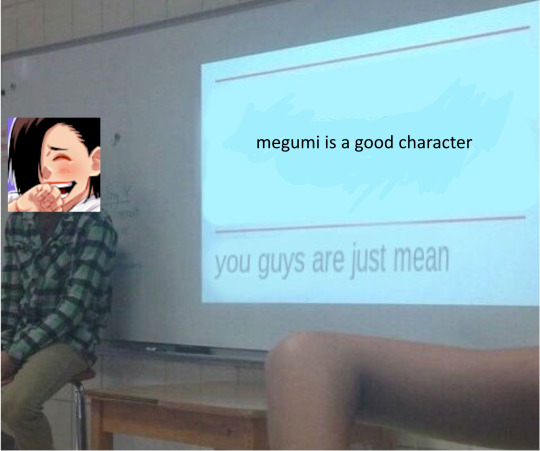
So I was genuinely surprised last week when we were finally shown Megumi's mental state inside Sukuna and he was predictably at his lowest point ever, and instead of sympathy from the fans most of the responses on twitter I saw were people mocking him.
Which I am going to assume comes from a misunderstanding as his character. You see Megumi doesn't fit into the role of the black haired supporting protagonist / rival well. He's not Sasuke, he's not Uryu Ishida, he's not Yuno but he's not meant to be a rival or even a typical shonen character who's progress is only measured by a series of power ups. Megumi is perhaps one of the most subtly written characters in the manga, and perhaps he's hard to sympathize with because he doesn't fit into easy to udnerstand shonen tropes. Which is why I will try to explain his arc below and why Jujutsu Kaisen does it like no other manga currently running.
1. Meet Potential Man
Let me introduce you to the worst meme on twitter.

Megumi's inability to live up to his potential to reach his full power as a sorcerer is probably his biggest flaw, one that is rightfully called out by the narrative again and again, but apparently an intentionally written character flaw is bad writing.
It's covered in Gojo's "Swing for the fences" speech.
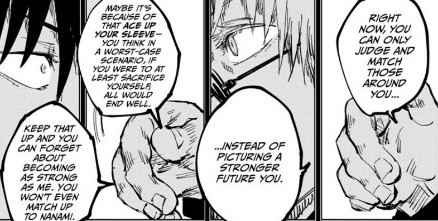
Gojo notices Megumi bunt in the baseball game and decides to confront him about it later. He highlights that while bunting is alright in baseball, and it's good to sacrifice yourself so your teammates can advance in a team sport that being a sorcerer is a solo sport. No matter what Megumi is going to reach a point where he's forced to fight alone, and instead of trying to push himself to be as strong as he can be he intentionally limits himself to cooperate with the sorcerers around him.
Basically, the opposite of Gojo who literally cannot fight with other sorcerers because he won't be able to fight at full strength as they just get in the way.
It's not just that Megumi can't use the ten shadows to its full potential, something pointed out by Sukuna, and then later again by Gojo, it's also that he always prioritizes either the group or someone else above himself when trying to decide how to act. Megumi is a semi-decent strategist so this is not necessarily a bad thing, but because of Megumi's tendency to care more about trying to live up to other people's expectations towards him, and what other people need of him rather than his own needs he doesn't have the attitude necessary for sorcery, especially since the strongest sorcerers don't take others into account at all and act like living calamities.
Megumi doesn't look at himself, he looks at the people around him. He judges himself based on what the people around him want from him, not what he wants. This is going to be a continual theme in his arc.
Sukuna is a living calamity, the definition of the attitude a strong sorcerer has, Gojo Satoru wields sorcerery only for himself, and is a sorcerer because he finds exorcising curses and using his god given talents to be fun for him.
Megumi's reason for fighting, his self worth, are all much, much less than the strongest characters in this series which is why he continually fails to live up to his potential. It's not because Gege is not good at writing or Megumi is a disappointing character, but rather he's been written as someone with tremendous potential under the pressure to live up to that potential but who continually fails to do so. Megumi's low self-esteem, low self-worth, and lack of self-identity explains both his failure to progress as a sorcerer something that requires selfishness and self-identity to reach greater heights in, but also his tendency to pick the suicide option with Mahoraga because Megumi genuinely believes compared to the others even just his classmates his life is simply worth less.
So potential man, is an intentionally written character flaw already called out in canon. The more interesting question is why does Megumi fail to live up to his potential.
2. Meet The Original Potential Man
So, I said that Megumi is not like a lot of characters in Shonen Jump but that doesn't mean he's entirely unique. To help explain Megumi's inability to live up to his potential I thought it would be helpful to compare him to a character he's clearly inspired by.
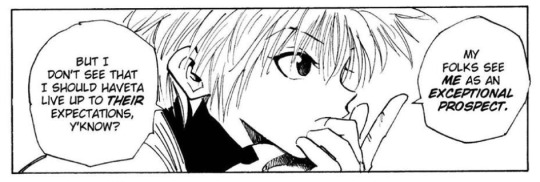
Killua Zoldyck, is the deuteragonist of a manga called hunter x hunter. You may have heard of it, Gege certainly has. Killua is born into a family of assassins who all have supernatural powers. The assassins inflict incredibly harsh training on their children from birth in order to raise them into assassins because their potential as assassins is all that matters. They also start with a "Z".
Killua is apparently the most talented Zen'in... I mean Zoldyck of this generation, though he's still young so he's weaker than his father and brother he's expected to easily surpass them one. Which is why Killua's family has already decided for him that he's going to be the next one to take over the family, Killua's opinion doesn't matter. Illumi and Silva are both setting him up for success by forcing their "help" upon him. Several other members of the family even point out that Killua probably doesn't have the attitude to be the head of the family, but what does it matter when he's got such great talent?
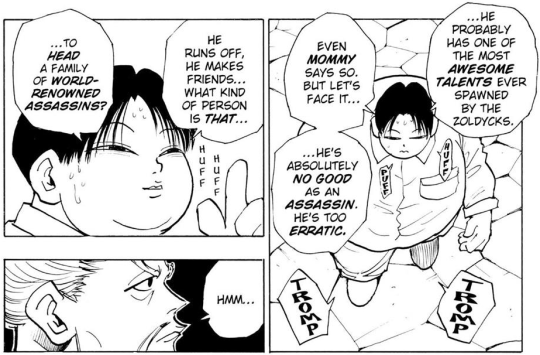
Killua is a complicated victim. He's a victim of many things, familial abuse is the most obvious one because the Zoldyck have a nasty habit of torturing their children, but the less obvious one is grooming. Not in a sexual sense, but rather the adults in Killua's life have decided to use their authority over him to manipulate him into becoming what they want him to be - the next head of the family.
What's insidious about this is the Zoldyck's don't just torture or beat Killua into submission, they will use any tool in their arsenal, familial love, emotional blackmail, threats, all to undermine Killua's agency and choices in order to make him not only do what they want to do but make him think he has to grow into the person they want him to.
Grooming not in a sexual sense, but definitely in a psychological sense, an adult using their authority as an adult over a child and their maturity to manipulate that child into becoming what they want them to be instead of letting that child grow naturally. When it's used in a sexual sense it's when an adult establishes a connection with a minor, and then uses that connection in the long-term to manipulate them into having a relationship and lower the child's inhibition. Think of that, but without the sexual part - an adult using their relationship with a child often in a long-term manipulation to lower the child's inhibitions and make them more malleable and raise them to do what you want them to do.
Killua has not been sexually groomed, but he has been groomed by both his parents and his brother to make him more suggestible to becoming the family head which is something he explicitly does not want to do. Not only did Killua's family only raise him for the purpose of becoming an assassin and taking over the family one day (raising him as a child into an adult, his emotional maturity, his health and well being are all secondary priorities to what Killua can do for his family) they also manipulate him into thinking he has no choice other than being an assassin.
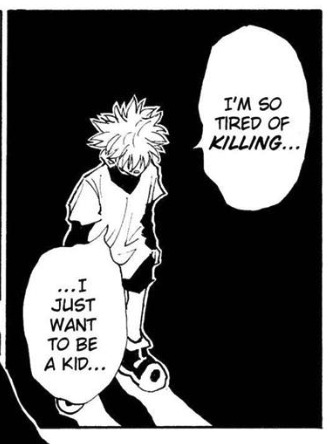
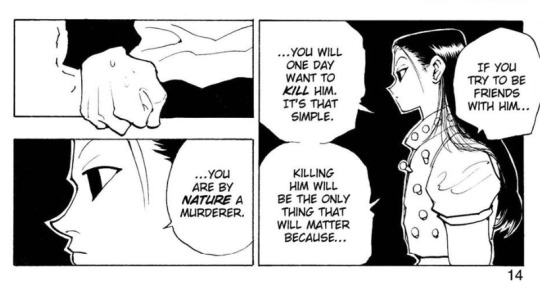
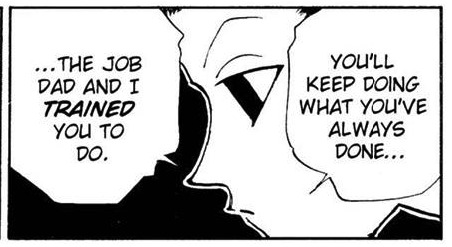
Killua is a kid put through extremely harsh training from a young age, to do a horrible job that is being an assassin that doesn't let him make normal friends or have a normal life. On top of the physical abuse he's already endured, whenever he expresses a desire to do something else in his life, his parents send Illumi to emotionally manipulate him into thinking that not only is he a natural born killer, and therefore a bad person who deserves all the abuse he's been put through, to further convince him that his only path forward is to be an assassin.
Killua is a character who has a lot of power, but little agency. Agency, in fiction is the ability a character has to take action and make decisions for themselves. Despite Killua starting as a more powerful and more savvy character than Gon, he has little agency and is often very passive. He doesn't act, he reacts. Even running away from his family is a reaction. We don't really see what he wants in life, we just know that he looked at his family and went "NOT THAT". However, his entire identity is still formed in response to his family's abuse. Even when he gets farther away from them, Killua doesn't really do what he wants, he does what Gon wants, and follows around Gon.
However, it's very understandable why Killua doesn't act with a lot of agency, when Killua does try to make decisions his family always shows up to undermine him and make another attempt to emotionally manipulate him into doing what they want. It's not always Illumi showing up to spook him. Silva pretends to be a loving dad for five minutes and has a heart to heart conversation with his son, and lets his son go adventuring with his friends but that too is a manipulation. He only did so to make sure Killua would eventually come back, by giving Killua more positive memories that would make it harder to make the decision to leave the family.
With the extent that Killua's family goes to sabotage any decision he makes, it's no wonder Killua is so passive and afraid to make his own decisions. It's almost like a character flaw he's gotta work on.
Now here's where I'm going to blow your minds. Megumi is an incredibly similar character to Killua, they are both the victims of longterm grooming however people don't like to acknowledge Megumi's victimhood. That's because in Killua's case, his abuser looks and acts like this.
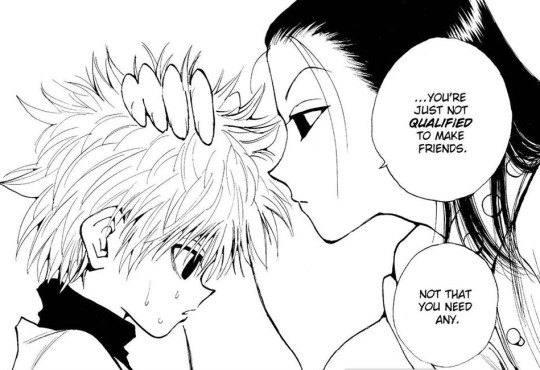
Killua's abuser Illumi is a creepy guy who looks like the girl from the grudge, telling him he's not allowed to make friends and giving off such rancid vibes that he's obviously a bad guy. Whereas, Megumi's groomer this this guy.
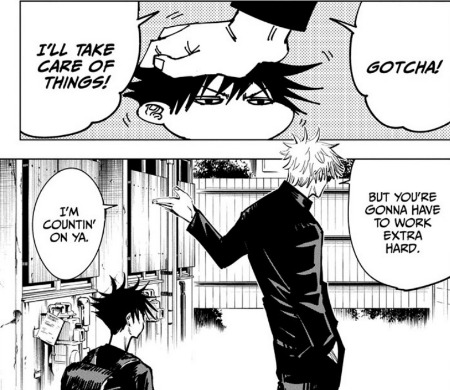
Gojo Satoru who is one of the most popular characters in the series, and who also gives speeches about how he wants to let children be able to live out their youths, which is why it's hard for the fandom to see that he has taken advantage of Megumi and stolen his youth away from him pretty much the same way that Silva / Illumi has for Killua.
Megumi, like Killua has no choice in who he wants to be when he grows up, or what kind of person he wants to grow into. Megumi, like Killua has been groomed for a young age and forced into an incredibly dangerous and life threatening job that he does not want to do, that denies him the chance of a normal life, and that does not really allow him to make many friends. Megumi is railroaded onto this path, not by his choice, but by Toji's choice, and later Gojo's choice... because he has potential. Megumi like Killua cannot leave his family and stop being a sorcerer, otherwise his little sister who is the only family member he cares about will be hurt.
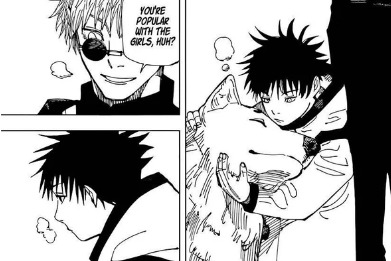
Gojo doesn't show up with an evil aura looking like the grudge girl and telling Megumi that he doesn't have the right to make friends, and that he's inherently evil and a puppet that only exists to kill people though so it's harder to tell that Megumi is a victim of the same kind of grooming that has hurt Killua so thoroughly.
This is what I mean when I say a lot of Megumi's characterization flies over your head because his victimization is written really subtly. Gojo does the same thing that Illumi / Silva does to Killua, he may seem like a stand up guy compared to those two but Megumi has about as much choice about what he can do with his life that Killua has.
Not all grooming is Illumi showing up with his spooky eyes to intimidate and coerce Killua into submission. Silva shows up to give Killua the first fatherly talk he had in his life, and lets him go from the mansion.... not because he realized he was wrong for restricting Killua's life choices and giving him no choice but to become heir.
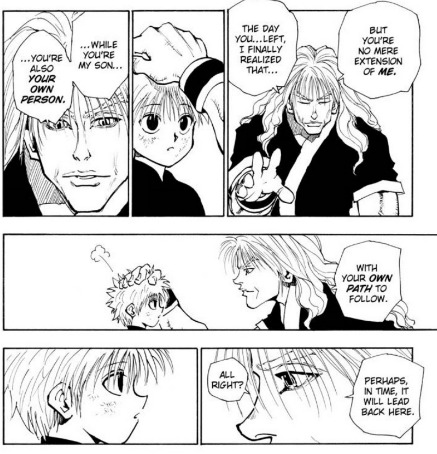
No, it was a ploy to guilt trip him into coming back because he knew if he held Killua there by force he'd just run away the next chance he got. Fear and intimidation wasn't working at keeping Killua in line, so they switched to love instead.
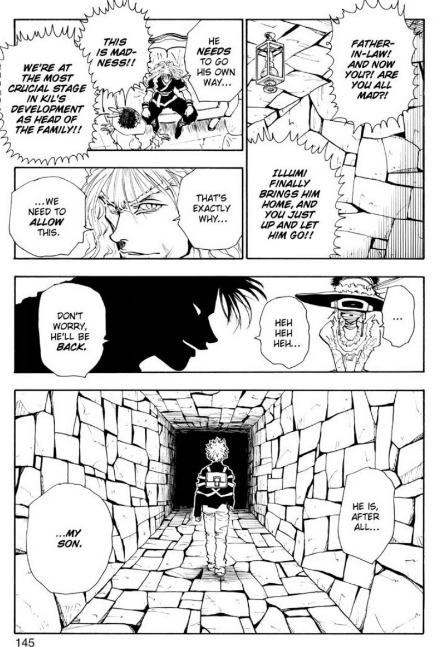
Gojo can encourage Megumi to make friends, let him hang out and spend time with Itadori, even honor his wish to save Itadori and in the end still be manipulating him into becoming a sorcerer and not letting Megumi choose what he wants to do with his life. Gojo just prefers the carrot to the stick.
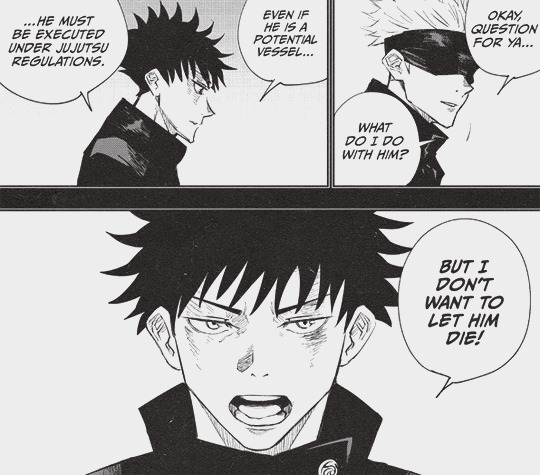
This is something the databooks confirm, that Gojo hunts prospects like Yuta, Yuji and Megumi not out of the goodness of his heart, but because they are talented students he can recruit to his cause with the added bonus that by appearing as their savior, they "owe" him.

Megumi is also a character lacking in agency, he is someone who's had no agency his entire life and what little agency he did have was stolen away from him by the adults in his life.
Let's analyze Megumi's situation for a second. As soon as Megumama dies, Toji gives up on the idea of fatherhood entirely, and decides to sell his son, literally, like in the sense of human trafficking to be raised by the highly abusive Zen'in Clan.

However, before the deal could be completed his father died in the middle of a mission. Megumi apparently saw his father so little that he didn't recognize him on coming face to face with him years alter, which says a lot about what kind of role Toji played in Megumi's life before he was outright abandoned.
Not only does Megumi believe his father just left him to run away with his new wife (Megumi's stepmother and the mother of Tsumiki) but now he and Tsumiki had to live together in a household without supervision for an indeterminate amount of time and watch their money slowly run out.
When it looks like they're about to start starving, Gojo Satoru shows up to save the day.... or not.
Gojo seems like he's offering Megumi a choice, but it's a loaded one. There's no choice in this scenario where Megumi gets to be a normal kid. The option of calling social services so this orphaned child does not starve doesn't occur to him.

Megumi's options are a) go to the Zen'in Clan and be a sorcerer where Tsumiki will be abused, or b) be a sorcerer under me where Tsumiki will be safe. The unspoken part is that if Megumi rejects his offer not only will he just let the Zen'in Take him, he'll also probably just let Megumi starve. Megumi the uh six or so year old child at this point has to sign away the rest of his life as a sorcerer, and work in order to earn money to eat.
No adult is taking care of Megumi, no one is raising him, even the food and shelter Megumi is given comes with a price tag that he has to pay back by being a Jujutsu Sorcerer and attending Jujutsu High as a teenager. Gojo even kind of subtly uses Tsumiki as a hostage to get Megumi to join with his agenda, because his offer isn't really much better than the Zen'ins but he needs Megumi on his side because he needs to raise kids to be future allies to his political agenda.
At the tender age of six Megumi signed his life away to be a sorcerer and he hasn't looked back since. Considering his severe behavioral problems getting into fights constantly at school, I think it's safe to say Megumi is about as reluctant to be a sorcerer as Killua is an assassin.
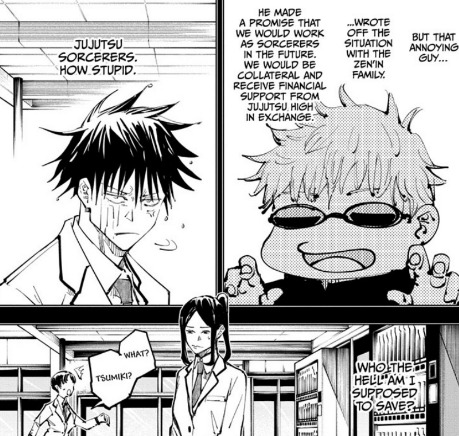
Honestly, if Megumi had phrased it like this:

"I'm so tired of being a sorcerer, I just want to be a kid."
Megumi would have a lot more fans, and Gojo would have a lot of explaining to do, but I think the brilliance of Megumi's grooming is that it's not really as blatant as Killua's. Megumi doesn't talk out loud about how he wants to be a normal kid, he's just angry at the whole world, and prone to fits of violence because he's mentall unwell.
Another way in which he parallels Killua, by the way.

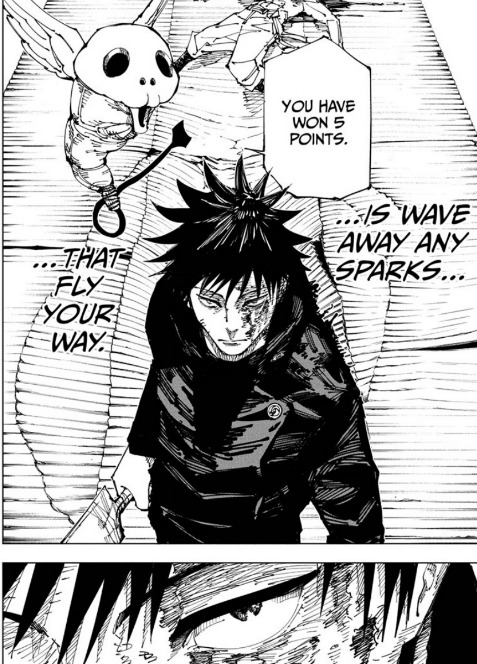
Megumi does not talk about his lost childhood out loud. Instead of knowing his thoughts on the matter, instead we are shown his behavior, the effects of having his childhood taken away from him and how unstable it makes him and left to ponder as the audience what Megumi himself thinks of this.
The same way that Illumi steals all of Killua's agency away, robbing him of the chance to be anything other than what the Zoldycks want him to be, so to does Gojo. It's just instead of Gojo using the stick, he uses the carrot. He is Megumi's benefactor, he's the savior, for whose help Megumi owes him, sort of like repaying a loan with interest.
Gojo tries to shape Megumi into Gojo Satoru 2.0. Or maybe a second Geto. That's more likely as it's Geto defection which inspires Gojo to go looking for him after neglecting to do anything about Megumi until a year after finding out about his existence. Gojo says that Megumi is going to have to work hard or else he'll be left behind, just days after Geto had left him behind. Megumi is helped by Gojo, he is protected from the clans by Gojo, he has been taken on missions alongside Gojo his entire life, Maki even refers to Megumi as a treasure that was raised carefully by him.

Gojo invests a lot of time and effort into Megumi and because of that Megumi is expected to "perform." However, he doesn't.
That's the thing, Megumi is supposed to be either Gojo or Geto 2.0 but he just can't be. THe reason why again is Agency. If Killua is limited because of his inability to decide for himself, then so to is Megumi b/c Nen and Cursed Technique Development both depend on things like imagination, ego and self-image to raise them up to their full potential.
However, Gojo has shot himself in the foot with regards to Megumi. Becoming a Jujutsu Sorcerer requires a strong identity, but Gojo by sabotaging Megumi's agency and ability to decide for himself every step of the way has robbed Megumi of the chance to form that strong identity.
Megumi, just like Killua has no sense of self and instead both judges himself according to others, how he meets their expectations, how he measures up to them - he also glorifies others while constantly putting himself down.
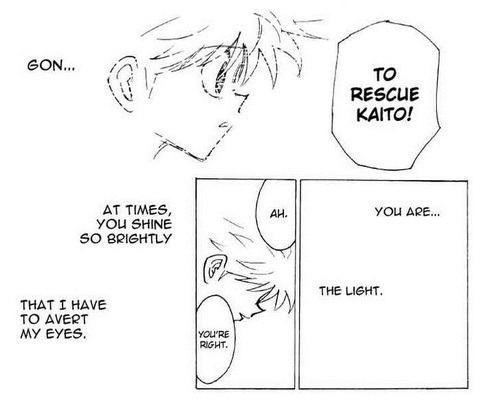
Megumi doesn't give speeches about how Yuji is like pure light, but he also refuses to let Yuji out of his sight post Shibuya, and even says it'd be better to be killed by Sukuna alongside Yuji if Sukuna does take over.
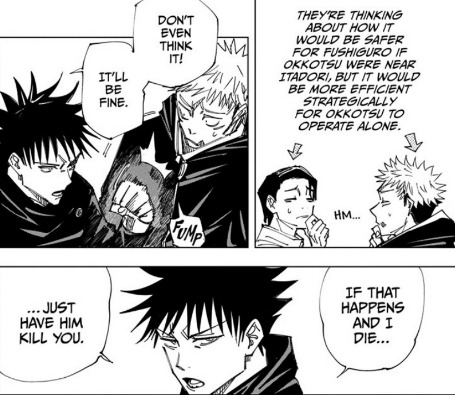
In the Chimera Ant Arc Killua defines all of his self-worth around being useful to Gon, and beats himself up for not being able to measure up to him - because Killua has no sense of self his selfhood has always been undermined by his family who wanted to make him more suggestible to what they wanted.
Megumi is flippant with his own life and very willing to lay down his life for another's sake, because Megumi has very little agency in his life and has been taught by both Gojo and his circumstances that he himself and what he wants does not matter. Megumi doesn't fight fate, and fight for what he wants because he's already been shot in the kneecaps by both Toji's abandonment, and Gojo Satoru, and he's having a difficult time just trying to stand with bullets in his knees.
Maybe, the reason Megumi is so willing to risk his life to summon Mahoraga and sacrifice himself if he thinks it will help his allies is because Megumi has been forced into a job where he's gonig to be expected to sacrifice his life for the greater good since the tender age of six years old and therefore everything in life has conspired to tell him his life is worth less than others.
Yuji isn't the first person in story to think of himself as a cog, that's Megumi. He doesn't even need Shibuya to beat him down to accept the cog mindset, Megumi is already there at the beginning of the story.

I think a lot of misunderstanding of Megumi's character comes from the fact that his grooming is more subtle and insidious, and not as blatant as Killua's, and also that it's done by a character well-liked by the fandom. However, if Megumi has all the same symptoms of Killua then it's logical to deduce that they share the same trauma
Even Megumi's summoning of Mahoraga has a tie to Killua.
There's a pattern of KIllua running away from stronger opponent that's established in HXH that's eventually revealed to be because of a needle that Illumi inserted directly into Killua's brain to mind control him to run if he faced someone that was too much of a threat.
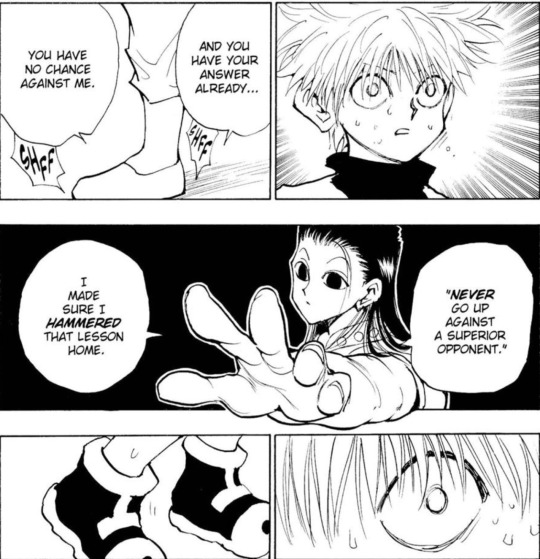
Obviously, that's just continuing the metaphor of the fact that Killua isn't able to believe in himself to face people who are stronger, because Illumi has been constantly putting him down his entire life.
Isn't this essentially what Megumi does as well?
When Megumi is faced with an opponent that's too strong or a hopeless situation, instead of running like Killua he summons Mahoraga. He does this because he doesn't believe in his ability to surpass his limits and fight, because he doesn't believe in himself or his own potential.

When is actually able to think more freely and picture a version of himself who can surpass his limits and who can do these things - these are the moments he is shown to grow.
Megumi however, for the most part isn't free. He can't think of himself as free and he can't free himself, because not only does he still have no choice about what he wants to do with his life (even if he becomes the msot powerful sorcerer in the world Gojo won't let him quit, he's gotta pay off those student loans), but he's also internalized the idea that he's not free. Not only has Gojo raised him to be a cog, Megumi has also accepted the fact that he is a cog and what he wants does not matter - the most he can do is hope that his actions will protect the people he loves and give them a little bit of happiness.
Megumi doesn't need a needle in his brain to control him and make him run away from fights and more obedient, because Megumi has already done all of that to himself with the toxic and self-harming ideas he's internalized.
Megumi and Killua having given up on themselves, try to make others happy, the same people they put on pedestals in order to make themselves feel even worse in comparison.
However, from this point Megumi and Killuas arcs go in opposite directions. You see after the Chimera Ant Arc when Killua hits his lowest point and his codependent friendship with Gon is exposed for what it is, Killua returns home in order to try and rescue his sister Alluka who is probably the reason he ran away in the first place.
Alluka and Tsumiki are both at the start of the story taken away from Killua and Megumi respectively, and with them the only genuine familial affection they ever enjoyed in their lives is taken too.

However, Alluka and Tsumiki are inversions. Alluka finds her freedom and agency, and Killua is able to reform his connection with his sister by accepting both pats of her, Alluka and Nanika. Afterwards the two of them finally leave their family home together and go off on a journey together.
If Alluka finds her personhood, Tsumiki remains a plot device. She never awakens from her coma, she's possessed instead and then murdered.
Now, here is where I point out how unfair the audience is being to Megumi. If you're a hunter x hunter fan remember all the character development that Killua gained by reforging his relationship with Alluka, how much confidence it gave him to connect to the one person who's even unconditionally loved him as a family member.
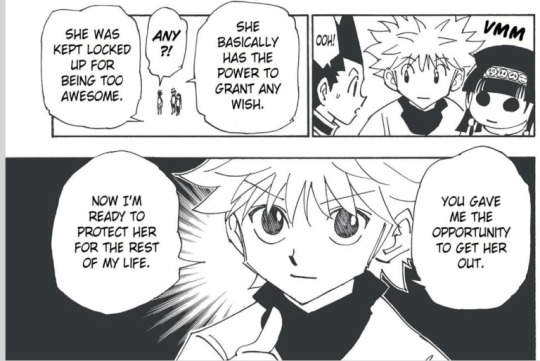
Now imagine that Alluka is brutally butchered right in front of him, and Killua has a first person point of view, because somehow in this scenario Illumi used a needle to mind control him into killing Alluka.
Do you really think Killua would be able to stand after that?
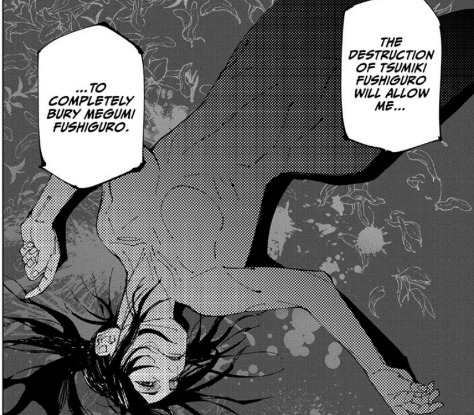
Sukuna is really just the last in line of a long line of people who've stolen Megumi's agency away from him, in order to benefit themselves. Sukuna even saw the same "potential" in Megumi that Gojo did.
Sukuna physically posessing Megumi's body, is just what both the Zen'in Clan, and Gojo Satoru have been trying to do to him in the most literal way possible. Gojo wants to remake Megumi into Gojo Satoru 2.0 with no regards to who Megumi is as a person, what Megumi's wants and needs are. No he just wants to raise someone as strong as him and pass the burden of protecting society onto Megumi, this starving orphan Gojo decided to exploit.
People have always used Megumi as a puppet for their own agenda, Naobito wanted to make him the head of the Zen'in Clan because he had the technique, Gojo wanted him to become the next strongest sorcerer / Gojo Satoru and also to replace the elders with Gojo's political agenda. They all want Megumi's "potential" for themselves to use to their own ends. Sukuna just takes what Gojo did one step further by literally stealing Megumi's body away from him and using him as a literal puppet instead of a metaphorical one. Gojo took Megumi's childhood by making him work as a sorcerer, Sukuna kills the physical embodiment of Megumi's childhood innocence by murdering Tsumiki, the only thing Megumi had in his life besides being a sorcerer, his only family, the only person he grew up with in his childhood years, the only person who loved him for who he was.
Megumi coped with what Gojo did to him the same way Killua did, by building himself around his use to others, and by building his identity around protecting others but now that's all gone. Tsumiki is gone, Megumi is trying to kill his friends, and he's already butchered Gojo Satoru.
Yet the fans are surprised that Megumi doesn't immediately get back on his feet.
However, and this my slightly optimistic ending to the post. Perhaps, Megumi is going the complete opposite of Killua, because what Megumi needed to learn was not to grow strong and confident enough to protect his sister but to learn to fight for himself.
At this point Megumi has nothing else left. It's sink of swim. He either develops a strong enough identity to regain control of his body and push Sukuna out, or he loses and the anti-Sukuna team will just have to resort to killing Megumi along with Sukuna.
Even in that case.
Megumi not being saved by Yuji is a good thing.
Because a victim who gets rescued by a hero still has no agency.
Megumi told Yuji that he needs to start by "saving me."
However, it might just be the opposite. Before Megumi can save anyone else, before he can become a protector, he has to find his own power and save himself. He has to both accept thathe's someone worthy of salvation, and at the same time he can't just passively accept the hand that Yuji's offered to him he has to actively be the one to break free of Sukuna and save himself.
Megumi can't become the strongest sorcerer by becoming the next Gojo Satoru or being what Gojo or Sukuna wants him to be. THe only way Megumi can become the strongest, is by being himself.
#jjk meta#hxh meta#megumi fushiguro#killua zoldyck#gojo satoru#illumi zoldyck#ryomen sukuna#jjk spoilers#jujutsu kaisen spoilers
402 notes
·
View notes
Note
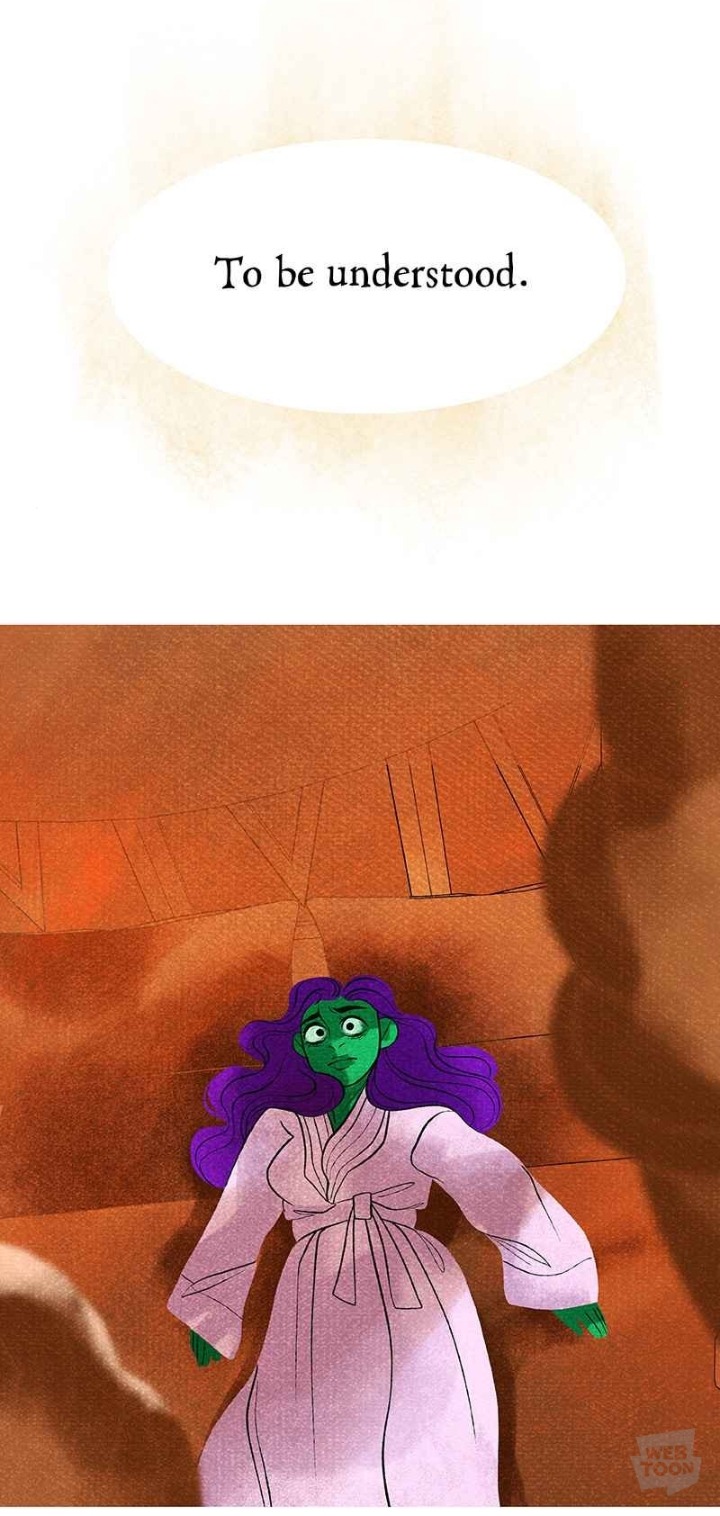
This plot point annoyed me so much! I thought she was finally going to open up to Persephone about the reasons why she hated Hades so much, about what he did to her, but no! They just introduced a new yet unnecessary character to the story 🤦🏼♀️
What are your thoughts about it?
oh yeah it annoyed the piss out of me too and for one very big reason that is CHRONIC in LO:
It's a solution to a problem Demeter didn't have.
This happens to a lot of characters throughout the comic. They'll have some kind of plot-driven conflict or character-driven flaw, and then it will be solved by something else entirely that had nothing to do with their original problem or doesn't line up with the theme of their storytelling. Minthe had insecurity issues and a toxic relationship with Hades? Just give her a classroom full of children to babysit! Hades had infertility issues? That's fine, Persephone somehow fixes those issues because at the end of the comic they have babies and Hades has his happy ending so it's fine! Hera was in an unhappy relationship with Zeus and had trauma from her past as a victim of Kronos? No problem, just make her an all powerful fertility goddess! Persephone accidentally causes winter which kills possibly thousands of people? Gaia is here to save the day, and also she's the one who makes Persephone return to the Mortal Realm for a couple months with full visitation rights. Apollo is a serial rapist who's attempted murder on several occasions, even against his own father in an attempt to take the throne? Community service, that'll solve it.
Demeter is one of the biggest examples of Rachel's inability of writing an actual cohesive plotline. She writes like the only goal is to come up with new twists to keep people reading each week without ever considering what themes or questions she should be answering throughout. So when she does pose questions, the answers often wind up being severely disconnected because she can't be bothered to actually plan out a plotline with narrative structure, she just needs 'things' to happen. To put it bluntly and simply, she writes like how a 13 year old on Wattpad would write, no actual thinking about the material she's presenting, no consideration for the curtains and what color they are, just "make the things happen so that people will keep reading because that's what writing is!"
Demeter's problem wasn't her failing to understand Persephone. It was people failing to understand her when she had reasonable cause to both be wary of Persephone moving to Olympus as well as Hades and his intentions with her daughter. But because Rachel needs to have the perfect happy ending for her self-insert power fantasy couple, she resorts to gaslighting both Demeter as well as the audience by extension into believing that the solution to Demeter's character arc... is understanding Persephone more.
Like first of all, the moral "people just want to be understood" is way, WAY too "baby's first storyline" at this point in the story especially when we've tried to tackle much bigger topics like sexual assault, and when we know how complex Demeter's backstory is. There's no way she needs to be told by Hebe that people just want to be "understood". She absolutely knows this already, and has been fighting to be understood by her siblings and peers and family for centuries, but of course, everyone sees her as just "the contrarian".
But then the final solution is... the sudden appearance of Demophoon as her long-lost child, and Hades giving her the volcanoes. That's it. She doesn't get to actually become Queen of the Mortal Realm, she never really gets closure over the past 2000 years of abuse from everyone around her, Hades just - like with everyone - buys her affection and she gets a new baby to pour her attention into instead of Persephone and we're all just forced to go along with it for the sake of Rachel's fantasy.
Rachel can't write (¬_¬;)
#ask me anything#ama#anon ama#anon ask me anything#lore olympus critical#anti lore olympus#lo critical
173 notes
·
View notes
Note
I love Thicker Than very much but my first love will always be Blood Moon and I decided to reread it today and I just. I genuinely wish that I could write like you sometimes because you are so, so good at it. Your imagery is so vivid, your worlds are immersive, your characters are real and flawed and kinda messed up but that's what makes them so loveable. And to top it all off, you're hilarious as well? How dare you actually. Very rude of you indeed.
Anyway all this to say: love your work, love you, hope you're well and I will uncover your (writer) secrets.
This ask genuinely made me tear up. Thank you so much.
These are my writer secrets (most of which I learned from other writers or from the internet but some are actually me):
It's better to write a book that 50% of people hate and 50% of people love than to write a book that everyone thinks is just fine.
Be toothy. Be weird. Be yourself.
Have characters do something while they're talking so they're not just standing there saying things at each other. This came from a tumblr post which said something like 'make them do the dishes' and it's genius. First draft of the first chapter of Blood Moon: Marco didn't have a cigarette or a coffee. I gave him those so he could have some character action during his monologue and it made it 100x better.
Personally: I dislike 'relatable' characters. I would much rather have a weirdo character than one that's relatable. That's my preference as a reader to, which, actually reminds me.
READ. You really need to read. If you don't read, you won't see what others are doing, you won't be aware of what books (interactive or otherwise) even can do. All good writers are readers.
I sucked at English at school, and people still sometimes say snide things about my inability to spell. I don't care. Good English student =/= good creative writer. Actually, I think a lot of people who achieved a lot in school give up really quickly at writing because it's not typically a quick or easy path to success. The amount of people who've said to me 'I did NaNoWriMo once but nothing came of it' is... a lot. That's one month. They wrote for one month and expected to be a blow up success. That's not the reality. Because...
Being a persistent wee bitch and loving what you do is way more important than 'talent'.
I'm in a weird mood. I'm sorry. I just want to talk about craft and stuff. I love writing so much.
62 notes
·
View notes